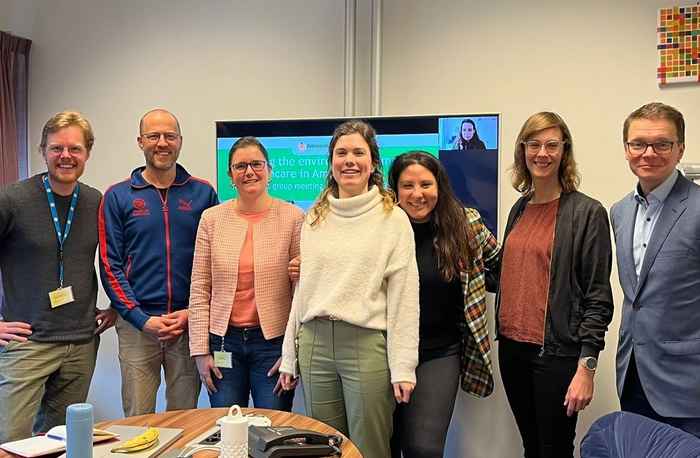Understanding the environmental footprint of healthcare
15 January 2025

The article was written in collaboration with researchers from the AUMC and the Amsterdam School of Communication Research (ASCoR).
Climate change and healthcare: a dual challenge
Climate change is the greatest global challenge of our time, with profound implications for human health and ecosystems. At the same time, healthcare services are themselves significant contributors to greenhouse gas emissions. Recognising this paradox, the multidisciplinary team conducted research and published their article in Environmental Health Perspectives. Their article was featured together with an invited perspective article written by field experts. This study stems from an interdisciplinary research project that received the UvA Sustainability Seed Grant.
The healthcare sector’s carbon footprint
Healthcare both addresses the health crises intensified by climate change and amplifies the problem through its own emissions. It is estimated that healthcare services are responsible for 4.4% of global greenhouse gas emissions. This can increase up to 10% in high-income countries. Despite this significant impact, research on healthcare-related emissions has historically lagged behind other industries. This is due to the sector's critical societal role. However, in recent years, there has been a surge of interest in healthcare sustainability. This renewed interest is mainly driven by healthcare professionals who are passionate about environmental responsibility.
Mapping the state of the science
What is the state of the science (the current level of knowledge, understanding, and evidence) in this subject area? To better understand this evolving field, Küçükkeles and Kourula joined a project with colleagues from the AUMC (Lisanne Kouwenberg, Eva Cohen, Wouter Hehenkamp, Lynn Snijder, Jasper Kampman, Niek Sperna-Weiland, Dionne Kringos) and the UvA’s Amsterdam School of Communication Research (Marijn Meijers, Eline Smit). Their goal was to map the current state of research on healthcare emissions. This is currently highly fragmented across various disciplines.
The resulting systematic review explored the carbon footprint of hospital services and care pathways, highlighting key emission sources and the variability in carbon impacts across medical specialties and settings.
Their analysis of 76 studies across 151 hospital services and care pathways revealed several key insights:
- Major carbon hotspots include travel, facilities, and consumables, while waste disposal has a relatively minor impact.
- Emission patterns vary significantly depending on the type of medical service, specialty, and hospital setting. This underscores the need for more localised studies.
- Methodological inconsistencies limit the comparability of studies. One-quarter of reviewed studies lacked sufficient quality. This highlights a need for more standardisation in carbon footprint assessments.
This review is an important first step in identifying knowledge gaps and setting a foundation for future research. The ABS researchers invite other scholars and healthcare professionals to build upon these findings and contribute to a more sustainable healthcare sector.
Advancing interdisciplinary collaboration at the UvA
This study is the first joint publication of our interdisciplinary collaboration across 3 faculties. It demonstrates how the UvA’s support for interdisciplinary research and interdepartmental collaboration can foster science that has an impact on society. The study is also an example of increasing collaboration between the Amsterdam Business School and the AUMC through initiatives such as ARCHE and SEVEN.
Beyond research, these findings and collaboration provide much-needed teaching material and a knowledge base for courses. A good example of this is how our co-authors in this study contributed as mentors in the Healthcare MBA programme’s Ethics and Sustainability in Healthcare course.
Future research directions
As part of their ongoing commitment to advancing healthcare sustainability, Küçükkeles and Kourula are currently working on several research projects (also with other collaborators). These projects explore topics such as:
- The role of continuous education in accelerating sustainability within healthcare.
- Sustainability challenges specific to the pharmaceutical industry.
- How alternative innovation approaches can drive faster and more sustainable pharmaceutical development.
Through these efforts, the ABS researchers aim to bridge the gap between sustainability research and healthcare practice. Their aim is to ensure a more environmentally responsible future for this sector.